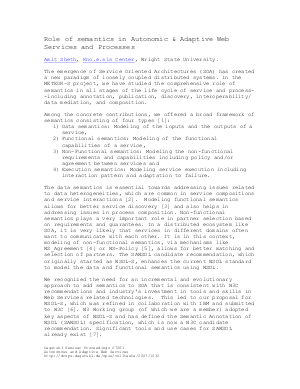Role of semantics in Autonomic and Adaptive Web Services & Processes
Author Amit P. Sheth
-
Part of:
Volume:
Dagstuhl Seminar Proceedings, Volume 7061
Part of: Series: Dagstuhl Seminar Proceedings (DagSemProc) - License:
 Creative Commons Attribution 4.0 International license
Creative Commons Attribution 4.0 International license
- Publication Date: 2007-06-05
File

PDF
DagSemProc.07061.4.pdf
- Filesize: 197 kB
- 3 pages
Document Identifiers
Subject Classification
Keywords
- Adaptive web service
- autonomic web service
- adaptive web process
- autonomic web process
- data semantics
- functional semantics
- non-functional semanti
Metrics
- Access Statistics
-
Total Accesses (updated on a weekly basis)
0Document
0Metadata
Abstract
The emergence of Service Oriented Architectures (SOA) has created a new paradigm of loosely coupled distributed systems. In the METEOR-S project, we have studied the comprehensive role of semantics in all stages of the life cycle of service and process-- including annotation, publication, discovery, interoperability/data mediation, and composition. In 2002-2003, we had offered a broad framework of semantics consisting of four types:1) Data semantics, 2) Functional semantics, 3) Non-Functional semantics and 4) Execution semantics. This talk describes the need for the four types of semantics, its standards-based support through WSDL-S/SAWSDL, and the need for such semantic representation to dynamic and adaptive SOA. We also briefly review the proposal for Adaptive Web Processes introduced earlier in a ICSOC 2005 vision talk.
Cite As Get BibTex
Amit P. Sheth. Role of semantics in Autonomic and Adaptive Web Services & Processes. In Autonomous and Adaptive Web Services. Dagstuhl Seminar Proceedings, Volume 7061, Schloss Dagstuhl – Leibniz-Zentrum für Informatik (2007)
https://doi.org/10.4230/DagSemProc.07061.4
BibTex
@InProceedings{sheth:DagSemProc.07061.4,
author = {Sheth, Amit P.},
title = {{Role of semantics in Autonomic and Adaptive Web Services \& Processes}},
booktitle = {Autonomous and Adaptive Web Services},
series = {Dagstuhl Seminar Proceedings (DagSemProc)},
ISSN = {1862-4405},
year = {2007},
volume = {7061},
editor = {Jana Koehler and Marco Pistore and Amit P. Sheth and Paolo Traverso and Martin Wirsing},
publisher = {Schloss Dagstuhl -- Leibniz-Zentrum f{\"u}r Informatik},
address = {Dagstuhl, Germany},
URL = {https://drops.dagstuhl.de/entities/document/10.4230/DagSemProc.07061.4},
URN = {urn:nbn:de:0030-drops-10325},
doi = {10.4230/DagSemProc.07061.4},
annote = {Keywords: Adaptive web service, autonomic web service, adaptive web process, autonomic web process, data semantics, functional semantics, non-functional semanti}
}
